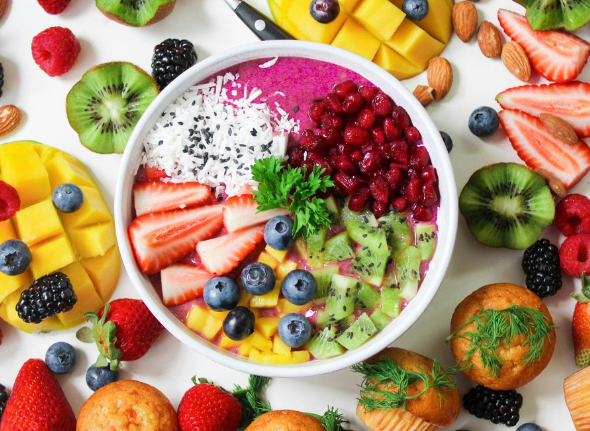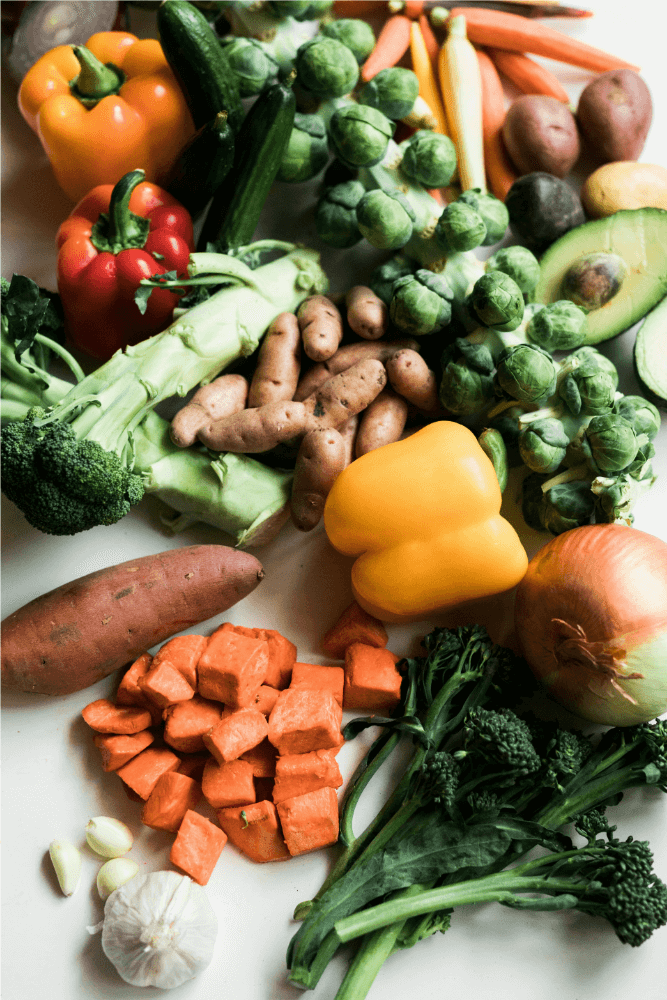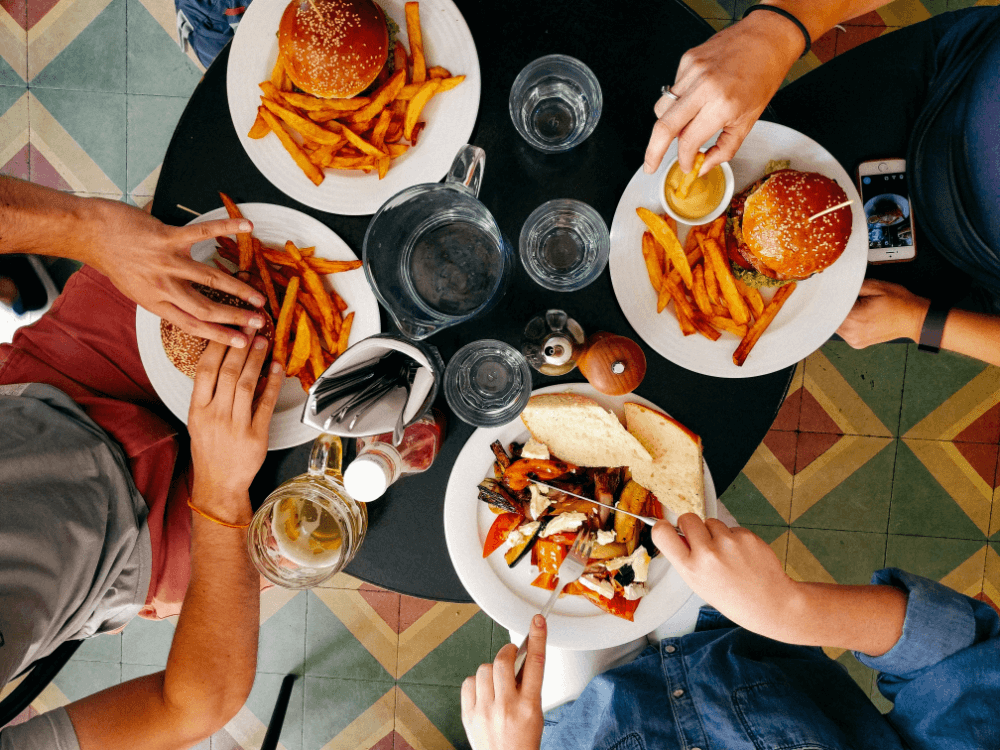Why is healthy eating so difficult?
Read this article to help you make small changes for a healthier lifestyle.


What are the barriers to healthy eating?
Healthy eating has become harder and harder over the last 50 years. Healthy organic food is much more expensive, the cost of living is much higher and healthy fast food is virtually non-existent. Besides Subway, all you will see in your local food hall or retail park is fast food, which may be cooked in unhealthy seed oils and have sodium levels through the roof. This makes it very difficult to eat well on the go. Convenience stores sell very few healthy, ready to eat snacks. Foods like raw meat and fruits like avocado are very expensive and it’s much cheaper to go with something processed like a Rustlers burger or a premade sandwich for example.
Another problem is that society is pushing unhealthy eating onto children and young people. It is normal to eat sweets and chocolate every day. It’s normal to eat fast food 2-4 times a week. When something is normalised, it makes it difficult for people to see the problem. That’s why I am writing this and trying to help people make healthier choices and show them why it could be a good idea.
What are the benefits of eating healthy?
There are a wide range of benefits to healthy eating, and these will be different for different people. Some examples include:
- Increased energy levels
- Better mood
- Lower anxiety
- Lower long term health risk
- Improved immune system and gut health
- Waking up feeling more refreshed and ready for the day ahead
- Having more sustainable energy throughout the day
Other benefits could be feeling more confident and enjoying social life more. The benefits of confidence and social life enhancement is subject to many other factors outside of healthy eating. However, the benefits you get from healthy eating can contribute to improvement in both areas. I am slowly starting to notice these benefits in my own life, step by step, which is the number one principle here.
How can you make better food choices?
Now you know the problems and barriers to healthy eating – but how can you overcome them step-by-step towards a healthier diet? I believe it all starts with mindset. You must understand why you want to eat healthier and have a strong why, or purpose to drive for it. For example, I have a chronic illness which is a big why to push me to eat healthily to feel better. For most people your ‘why’ won’t be that extreme but maybe you want to increase your fitness or boost your energy levels. In my opinion you will only succeed if you truly have a strong reason to care enough to eat healthy.
So, what can you do practically? Starting with shopping, you can gradually make healthier choices. Buy ready to eat chicken breast rather than breaded chicken. Think ahead and meal prep instead of buying pre-made meals. Consistent changes like this will compound into huge results over time. Consider where you are shopping if you are on a budget, supermarkets such as Lidl and Aldi tend to be better if you are on a budget and remember to check prices and stay within your limit.
Here is a list of cheap healthy organic foods:
- Eggs (£3-4 for 10)
- Sweet potatoes (£1-1.75 for 1kg)
- Bananas (>£1)
- Lentils (~£2)
- Canned tomatoes (>£1)
- Oats (£2-5, depending on product)
- Spinach (£1-2)
- Rice (£1-2)
Replace cereal with oats, potatoes instead of oven chips (but neither are terrible options), replace pot noodles with microwave white rice. Simply eat 2-4 eggs a day (scrambled or omelette best in my opinion!).
See some easy swaps below:
- Diet or zero sugar soda over originals
- Dark choc over milk
- Sweet and salted popcorn over sweet
- Electrolyte drinks over Red Bull or other energy drinks
- Water over juices
Remember occasionally treats are understandable, but there shouldn’t be a habit or frequently recurring. The questions you should ask every time you eat are: ‘How does this food serve me for my next hours?’ and ‘Is what am about to eat worth it all things considered?’. Also remember you mind will try to convince you to eat the unhealthy food. A lot of making healthy choices is being aware that your brain will be trying to sabotage you!


Eating out at restaurants or cafes
So, having covered what to do at home, now what do you do when you’re out for the day in a city or retail/commercial area?
Of course, your activity and location will affect what you can and can’t do but think of the following as general ideas. There are some “fast food” places that provide healthier options that can be a go to for food on the go. Places such as Subway or Nandos offer fast and convenient food, but made fresh with fresh ingredients. Also check out what is local to you, including independent cafes and restaurants.
A good way to think about eating out is to eat at these places 80% of the time and other fast food 20%. You don’t need to track this – just try to stick to the general rule. Restaurants are okay for the most part, preferably avoid burgers but besides that most options are healthy besides how some food is cooked is certain places (deep fried or seed oils).
There’s an interesting discussion around Seed Oils, me personally I try to avoid given my circumstances, if you would like to read more see this article on whether or not you should avoid seed oils.
If you want to learn more about ways to remain healthy when eating out, check out this article from the British Heart Foundation.
My next point is bringing your own food. Meal prep is valuable, pack some cold chicken and cold pasta or rice for example, and eat that while you’re out and about. It’s valuable because it assured you that you have a healthy meal to eat while out, so you don’t have to stress about food. See this page for some inspiration on what you can meal prep for food on the go.
What about exercising?
Exercise is not directly eating of course, but it’s still an important aspect of maintaining a healthy lifestyle. It is recommended that a person should get 8000+ steps per day, which can improve cardio and has been scientifically proven to enhance mood, especially when outside in nice weather and greenery. You can get a step tracking fitness tracker for as cheap as £10 which is useful if you are interested in monitoring your own data. If you would like to do some research on more advanced fitness trackers, which also monitor things such sleep, heart rate and your cardio health, take a look at this article on choosing the best smart watch for you.
There are loads of ways you can get moving to maintain a healthy lifestyle, see this Curriculum for Life article with lots of ideas to get moving.
Find out more
Learn about healthier food swaps on the NHS website
Find out some different ways to get moving in Greater Manchester with GM Moving.
Downloading Strava is a great idea to get you moving, it’s available free of charge on the Apple app store and Google Play app store.
The Reflex Active is a great, cheap (as little as £20) smart watch which tracks your sleep, heart rate and runs, and it works great with Strava!
If you are interested in fitness and want something a bit more intelligent, Garmin have some great wearable devices that tracks all sorts of health data that could be beneficial.
Related

Staying safe for Halloween
[rt_reading_time...

National Dyslexia Week: Thinking Differently About Dyslexia
[rt_reading_time...
